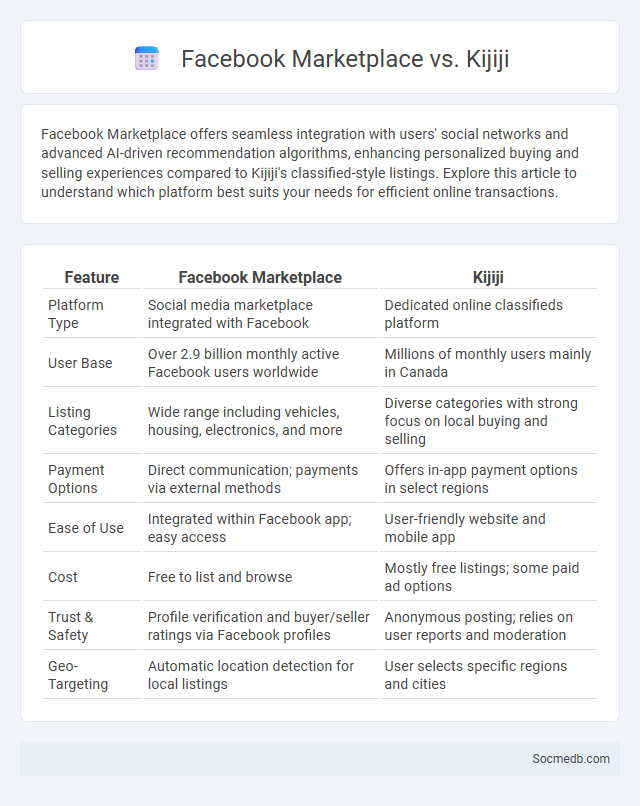
Photo illustration: Facebook Marketplace vs Kijiji
Facebook Marketplace offers seamless integration with users' social networks and advanced AI-driven recommendation algorithms, enhancing personalized buying and selling experiences compared to Kijiji's classified-style listings. Explore this article to understand which platform best suits your needs for efficient online transactions.
Table of Comparison
| Feature | Facebook Marketplace | Kijiji |
|---|---|---|
| Platform Type | Social media marketplace integrated with Facebook | Dedicated online classifieds platform |
| User Base | Over 2.9 billion monthly active Facebook users worldwide | Millions of monthly users mainly in Canada |
| Listing Categories | Wide range including vehicles, housing, electronics, and more | Diverse categories with strong focus on local buying and selling |
| Payment Options | Direct communication; payments via external methods | Offers in-app payment options in select regions |
| Ease of Use | Integrated within Facebook app; easy access | User-friendly website and mobile app |
| Cost | Free to list and browse | Mostly free listings; some paid ad options |
| Trust & Safety | Profile verification and buyer/seller ratings via Facebook profiles | Anonymous posting; relies on user reports and moderation |
| Geo-Targeting | Automatic location detection for local listings | User selects specific regions and cities |
Introduction to Online Marketplaces
Online marketplaces, such as Amazon, eBay, and Etsy, have revolutionized e-commerce by connecting millions of buyers and sellers worldwide in a single digital platform. These marketplaces leverage social media integration to enhance user engagement, facilitate targeted advertising, and enable seamless customer reviews and interactions. The growth of online marketplaces is driven by their ability to provide diverse products, competitive pricing, and convenient shopping experiences, making them central to modern digital commerce strategies.
Overview of Facebook Marketplace
Facebook Marketplace serves as a vast digital platform where millions of users buy and sell goods locally and nationally, offering a diverse range of categories from electronics to home goods. Its intuitive interface allows you to easily list items, browse deals, and communicate securely with potential buyers or sellers through Facebook's integrated messaging system. By leveraging Facebook's extensive user base and location-based search features, Marketplace provides a convenient and trusted environment for simplifying peer-to-peer transactions.
Overview of Kijiji
Kijiji is a Canadian online classified advertising platform owned by eBay, primarily used for buying and selling goods and services locally. It features various categories, including jobs, real estate, vehicles, and community events, facilitating social interactions within neighborhoods. The platform's user-friendly interface and localized approach distinguish it from global social media networks by emphasizing community engagement and peer-to-peer transactions.
What Makes “Marketplace” Different?
Marketplace stands out by offering a seamless platform where users can buy and sell items directly within their local community, enhancing convenience and trust. Your interactions are streamlined through easy access to product listings, user reviews, and secure messaging features, making transactions more efficient and transparent. This localized approach fosters stronger connections and quicker exchanges compared to traditional e-commerce sites.
User Experience Comparison
Social media platforms differ significantly in user experience based on interface design, content personalization, and interaction features. Instagram emphasizes visual content with a clean, intuitive layout, enhancing user engagement through stories and reels, whereas Twitter focuses on real-time updates and concise communication, prioritizing speed and relevancy. Facebook offers a comprehensive experience with varied content types and community building tools but can feel cluttered, impacting ease of navigation and overall user satisfaction.
Pricing and Fees Breakdown
Social media platforms primarily generate revenue through advertising fees, with pricing models ranging from cost-per-click (CPC) and cost-per-impression (CPM) to cost-per-action (CPA). Subscription-based services and premium features also contribute to fees, offering users enhanced functionality for a monthly or annual charge. Brands and businesses invest in targeted ad campaigns using algorithms that optimize spending based on demographics, engagement, and conversion metrics.
Security and Privacy Measures
Social media platforms implement advanced encryption protocols and two-factor authentication to protect Your accounts from unauthorized access. Regular updates and privacy settings allow You to control the visibility of personal information and limit data sharing with third parties. Vigilant monitoring for suspicious activities and prompt reporting mechanisms further enhance security and safeguard Your online presence.
Categories and Product Listings
Social media platforms categorize content into diverse niches such as fashion, technology, and food, enhancing user engagement through tailored experiences. Product listings on social media integrate detailed descriptions, high-quality images, and customer reviews to boost conversion rates and drive e-commerce sales. Leveraging hashtags and targeted ads within these categories increases visibility and market reach for brands.
Buyer and Seller Support
Social media platforms enhance buyer and seller support by providing instant communication channels and real-time problem resolution. Tools such as chatbots and direct messaging streamline interactions, improving customer satisfaction and trust. Data analytics on social media also help identify consumer pain points and optimize support strategies for e-commerce businesses.
Which Marketplace Is Right for You?
Choosing the right social media marketplace depends on your target audience, product type, and marketing goals. Platforms like Facebook Marketplace excel in local sales and diverse product categories, while Instagram Shopping thrives for visually-driven brands aiming to engage younger demographics. Analyzing user demographics, platform features, and integration options helps determine the most effective marketplace to maximize sales and brand visibility.
 socmedb.com
socmedb.com